Three Reigning Greco-Roman Junior World Champions Registered for #Trnava2018
Friday, August 31, 2018 - 02:31 By Eric Olanowski

TRNAVA, Slovakia (August 31) - The 2018 Junior World Championships kick off September 17-23 and each participating nation has summited their final entries to United World Wrestling. Nearly 265 Greco-Roman wrestlers from 43 nations will make the journey to Trnava, Slovakia with hopes of becoming a Junior World Champion.
Three reigning champions in Kamal BEY (USA), Kerem KAMAL (TUR) and Amin KAVIYANINEJAD (IRI) are registered to defend their titles from last years Tampere Junior World Championships.
Aleksander KOMAROV (RUS), the three-time age-level world champion and most dominant age-level wrestler in the world was expected to compete for Russia at 82kg but is not registered for the Junior World Championships. Instead, Russia has entered Shamil OZHAEV (RUS) at GR 82kg.
Greco-Roman wrestling begins on September 17 and will be wrestled through September 19.
ROSTERS
ALG
60kg - Mourtada NAANAA
72kg - Amar MOUMENE
ARM
55kg - Tigran MINASYAN
60kg - Ararat MANUCHARYAN
63kg - Hrachya POGHOSYAN
67kg - Malkhas AMOYAN
77kg - Vahe POGHOSYAN
82kg - Erik ELOYAN
87kg - Hakob BAGHDASARYAN
97kg - Razmik KHACHATRYAN
130kg - David OVASAPYAN
AUT
97kg - Markus RAGGINGER
AZE
55kg - Zulfigar ALIYEV
60kg - Hasan MAMMADLI
63kg - Elnur MUSAYEV
67kg - Mahammadali HASANOV
72kg - Ulvu GANIZADE
77kg - Nasir HASANOV
82kg - Nazarshah FATULLAYEV
130kg - Sarkhan MAMMADOV
BLR
55kg - Aliaksandr NIAHODA
60kg - Ihar DROZD
63kg - Maksim NEHODA
67kg - Aliaksandr LIAVONCHYK
72kg - Martun BADALIAN
77kg - Yauheni YUROU
82kg - Kiryl MASKEVICH
87kg - Ihar YARASHEVICH
97kg - Uladzislau PUSTASHYLAU
130kg - Ilya YUDCHYTS
BRA
67kg - Joilson DE BRITO RAMOS JUNIOR
BUL
60kg - Ivo ILIEV
63kg - Nikalas SULEV
67kg - Krasimir DORMUSHEV
72kg - Krasimir KRUMOV
77kg - Zahari ZASHEV
82kg - Svetoslav NIKOLOV
97kg -Delian ALISHAHI
130kg - Ignat MILENOV
CHI
130kg - Diego ALMENDRAS RODRIQUEZ
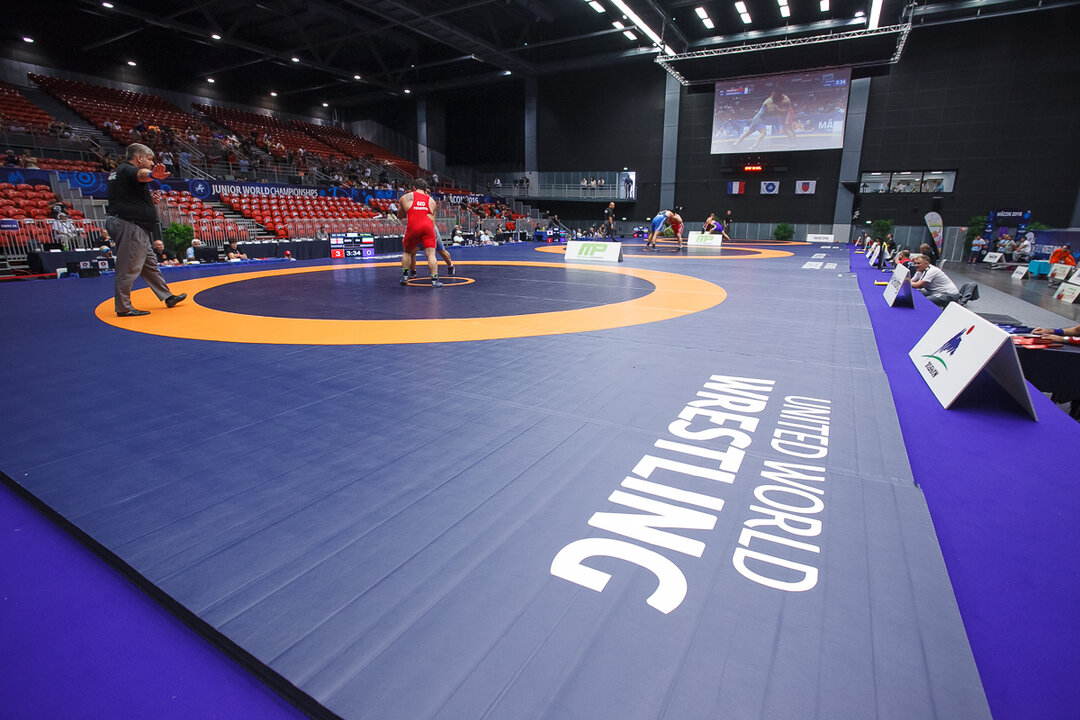 2016 Junior World Championship arena shot. Photo by Justin Hoch.
2016 Junior World Championship arena shot. Photo by Justin Hoch.
CHN
55kg - Liguo CAO
60kg - Libin DING
63kg - Delin WANG
67kg - Xin HUANG
72kg - Chuan ZHANG
77kg - Yilana YILANA
82kg - Wentao SU
87kg - Maimaiti KAISAIER
97kg - Yiming LI
130kg - Lingzhe MENG
CRO
72kg - Pavel PUKLAVEC
82kg - Karlo KODRIC
87kg - Filip SMETKO
130kg - Ante MILKOVIC
CZE
67kg - Denis MERTL
72kg - Jakub BIELESZ
77kg - David PRUSA / Daniel VARGA
87kg - Jakub KROCAK
130kg - Ondrej DADAK
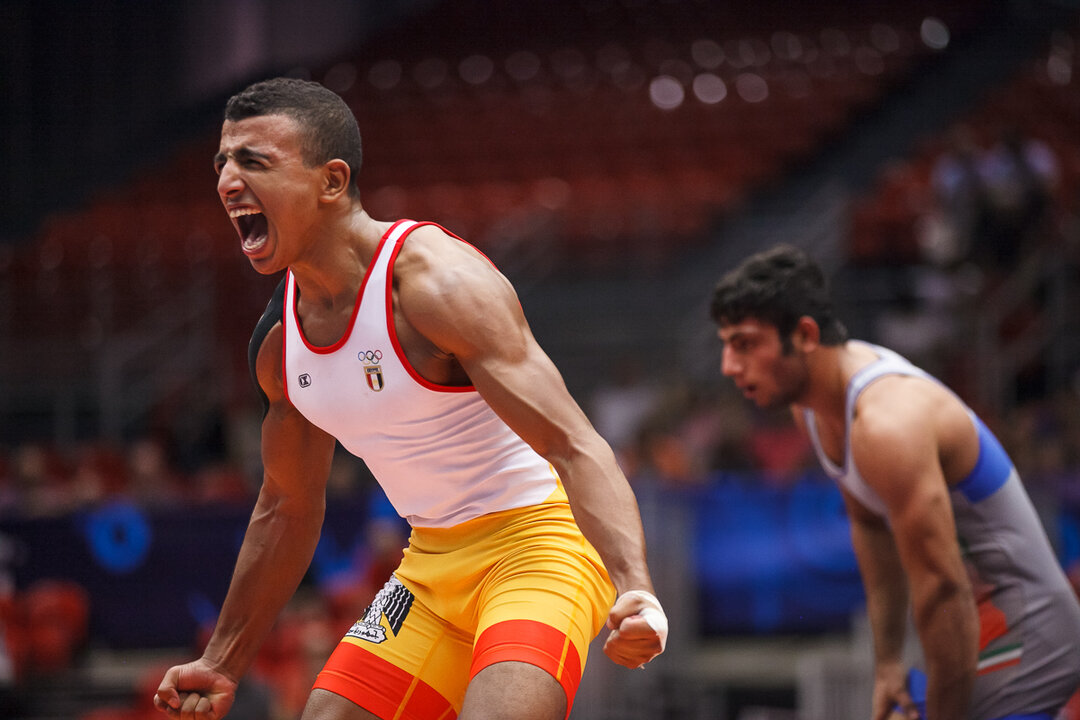 df. Mohammad Hossein MORAD ELYASI (IRI), 9-4-3.jpg) Mohamed ELSAYED, 2016 Cadet World Champion. Photo by Justin Hoch.
Mohamed ELSAYED, 2016 Cadet World Champion. Photo by Justin Hoch.
EGY
63kg - Hassan MOHAMED
67kg - Mohamed ELSAYED
72kg - Gamal MARZOUK
130kg - Youssef ISSA
EST
63kg - Denis BOLUNOV
67kg - Kristo VIIDAS
72kg - Andris PENT
77kg - Hans Uku LEITHAM
82kg - Ranet KALJOLA
87kg - Ardo PAJUR
97kg - Hendrik KALME
FIN
67kg - Elmer Joakim MATTILA
72kg - Akseli Elias YLI HANNUKSELA
77kg - Waltteri Harri Kristian LATVALA
97kg - Arvi Martin SAVOLAINEN
GEO
55kg - Ramaz SILAGAVA
60kg- Irakli DZIMISTARISHVILI
63kg - Leri ABULADZE
67kg - Joni KHETSURIANI
72kg - Nikoloz TCHIKAIDZE
77kg - Beka GURULI
82kg - Aivengo RIKADZE
87kg - Temuri TCHKUASELIDZE
97kg - Nika LOMIDZE
130kg - Beka MAKARIDZE
GER
60kg - Andrej GINC
63kg - Chlovelle Van MEIER
72kg - Anthony Ezra SANDERS
87kg - Nikolaos PAPADOPOULOS
130kg - Franz RICHTER
HUN
60kg - Tamas TOEROEK
63kg - Krisztian Istvan VANCZA
67kg - Tibor Sandor GYUERKY
72kg - Gergely BAK
77kg - Moric KISMONI
82kg - Istvan TAKACSHUN
87kg - Alex SZOKE
97kg - Balint VATZI
130kg - Roland VATZI
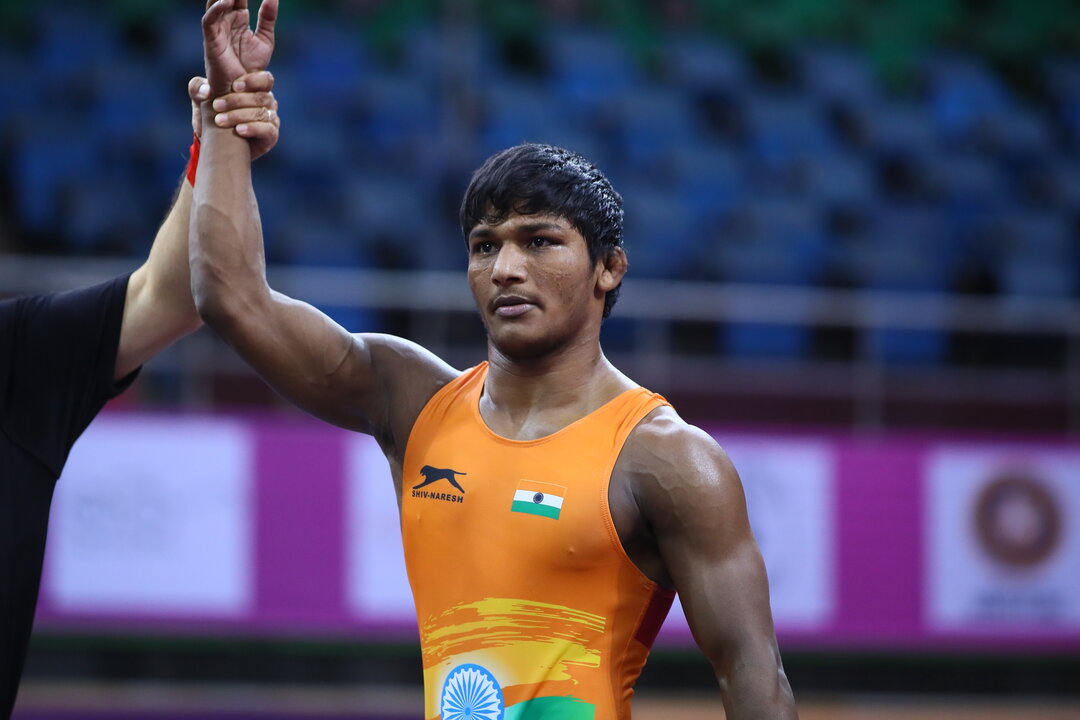 Vijay VIJAY (IND), 2018 Junior Asian Championship runner-up. Photo by Sachiko Hotaka.
Vijay VIJAY (IND), 2018 Junior Asian Championship runner-up. Photo by Sachiko Hotaka.
IND
55kg - Vijay VIJAY
60kg - Sachin RANA
63kg - Manjeet MANJEET
67kg - Malkit HOODA
72kg - Kuldeep MALIK
77kg - Sajan SAJAN
82kg - Sanjeet SANJEET
87kg - Kumar SUNIL
97kg - Viresh KUNDU
130kg - Aryan PANWAR
IRI
55kg - Pouya NASERPOUR
60kg - Ali NEJATI
63kg - Bahram MAROUFKHANI IMCHEH
67kg - Yousef HOSSEINVAND FATHI
72kg - Amin KAVIYANINEJAD
77kg - Shayan AFIFI
82kg - Hosein FOROUZANDEH GHOJEHBEIGLOU
87kg - Mohammadhadi SARAVI
97kg - Vahid DADKHAH GHASEM ABADI
130kg - Amin MIRZAZADEH
ISR
67kg - Shamil ALAEV
ITA
55kg - Giovanni FRENI
60kg - Jacopo SANDRON
67kg - Ignazio SANFILIPPO
77kg - Mirco MINGUZZI
97kg - Luca SVAICARIITA
JPN
55kg - Shota OGAWA
60kg - Kazuki YABE
63kg - Harushi SHIMAYA
67kg - Taishi HORIE
72kg - Minto MAEDA
77kg- Rai HAYASHI
82kg - Yudai SASAKI / Masao TANAKA
87kg - Ryohta NASUKAWA
97kg - Akira YAMANAKA / Naoki MATSUMOTO
130kg - Sota OKUMURA
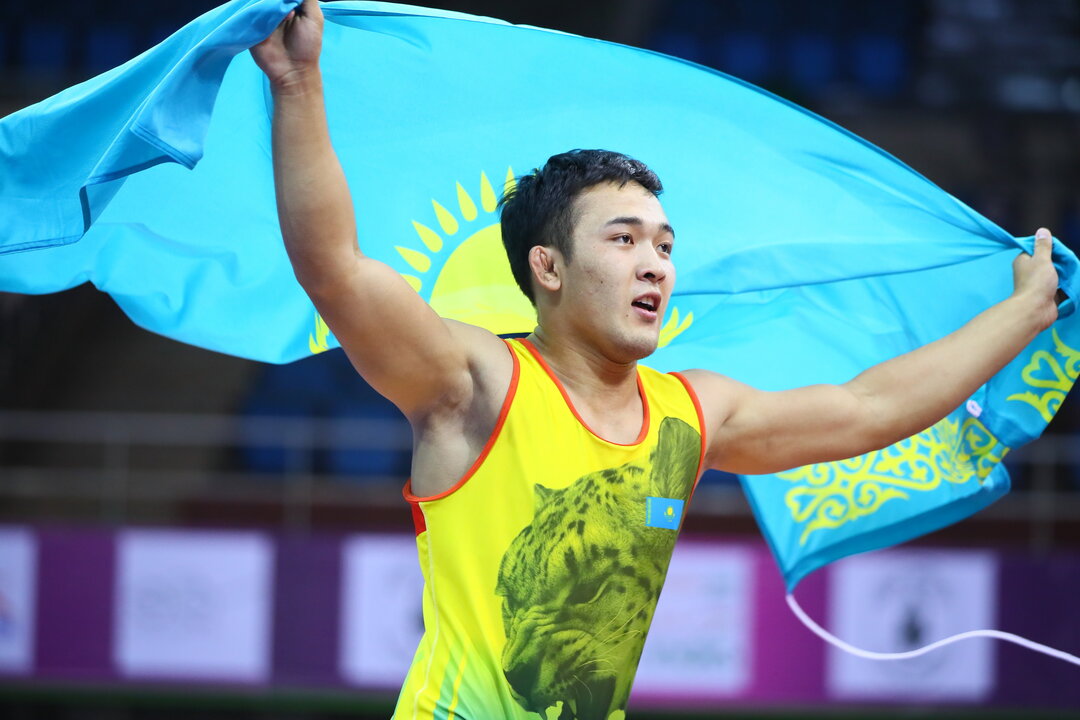 Merey BEKENOV, (KGZ) IBRAGIMOV Khalmurat_5_1.jpg) Merey BEKENOV (KAZ), 2018 Junior Asian Champion. Photo by Sachiko Hotaka.
Merey BEKENOV (KAZ), 2018 Junior Asian Champion. Photo by Sachiko Hotaka.
KAZ
55kg - Alpamys DASTANBEK
60kg- Galym KABDUNASSAROV
63kg - Madiyar MALTEKBAYEV
67kg - Merey BEKENOV
72kg - Daulet LARIONOV
77kg - Temirlan YESPENBET
82kg - Stanislav RYLSKIY
87kg - Sanzhar TEMIRBEK
97kg - Islam UMAYEV
130kg - Anton SAVENKO
KGZ
55kg - Nurtazin KERIMBERDI UULU
60kg - Dastan KADYROV
63kg - Erbol BAKIROV
67kg - Khalmurat IBRAGIMOV
72kg - Ilim BILIMOV
77kg - Akzhol MAKHMUDOV
82kg - Ilgiz BILIMOV
87kg - Amankeldi TALANTBEK UULU
KOR
55kg - Doohoon KIM
60kg - Seongmin KIM
63kg - Kyoungsub KIM
67kg - Unho HAN
72kg - Jueun JEONG
77kg - Boseong KANG
82kg - Inseob KIM
87kg - Junyeop PARK
97kg - Jeongbin KWON
130kg - Taeho YIM
KSA
55kg - Tuorki Ali M HAZOAZI
60kg - Hassan M WADDAN
LTU
60kg - Gytis KULEVICIUS
77kg - Titas KERSEVICIUS
97kg - Arnoldas BARANOVAS
MDA
67kg - Valentin PETIC
72kg - Anatolie POPOV
NOR
67kg - Haavard JOERGENSEN
77kg - Per Anders KURE
POL
60kg - Sebastian NOWICKI
63kg - Mateusz SZEWCZUK
67kg - Filip PETRONCZAK
72kg - Gracjan GLOGIEWICZ
82kg - Piotr DUK
87kg - Michal DYBKA
97kg - Gerard KURNICZAK
130kg - Patryk KAMINSKI
POR
55kg - Andre CARDOSO OLIVEIRA SILVA
63kg - Daniel DE MATOS OLIVEIRA DE MORAIS CA
ROU
55kg - Florin TITA
60kg - Razvan ARNAUT
82kg - Nicu Samuel OJOG
130kg - Lenard Istvan BEREI
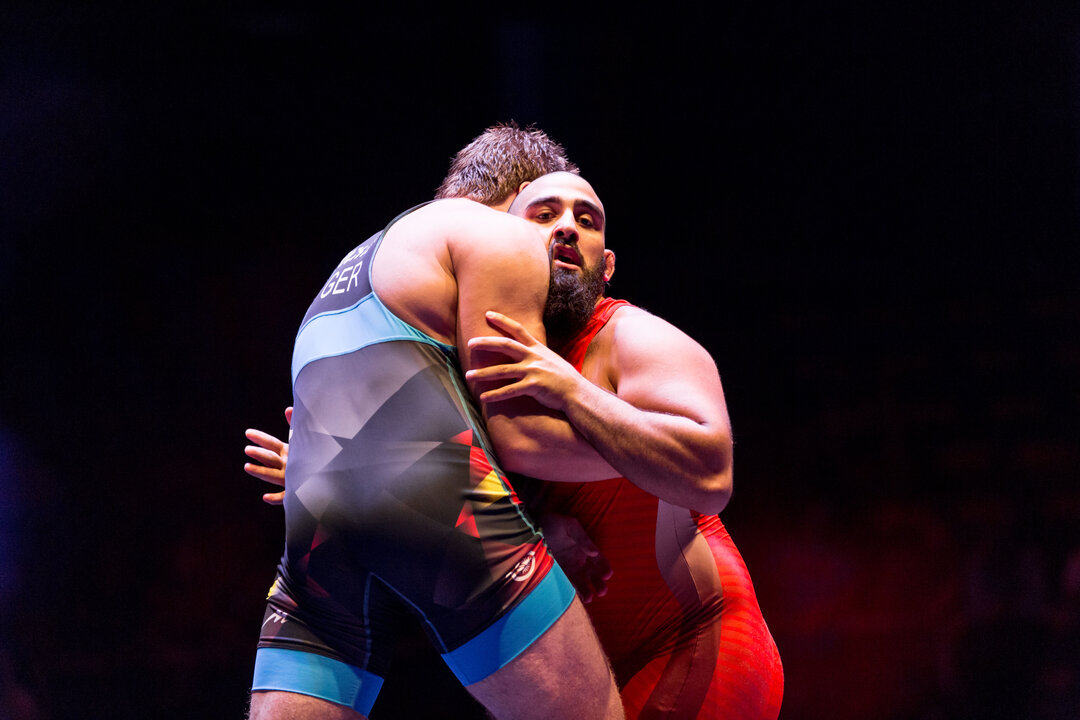 df. Franz RICHTER (GER) -by VFA, 2 - 1-3.jpg) Oleg AGAKHANOV, 2018 Junior European Champion. Photo by Max Rose-Fyne.
Oleg AGAKHANOV, 2018 Junior European Champion. Photo by Max Rose-Fyne.
RUS
55kg - Emin SEFERSHAEV
60kg- Abu AMAEV
63kg - Azamat KAIROV
67kg - Miakhdi IAKHIAEV
72kg - Sergei STEPANOV
77kg - Islam OPIEV
82kg - Shamil OZHAEV
87kg - Ilia ERMOLENKO
97kg - Artur SARGSIAN
130kg - Oleg AGAKHANOV
SRB
55kg - Sebastian KOLOMPAR
67kg - Adam KATONA
72kg - Sava MIJOKOVIC
77kg - Andrija Luka MALETIN
82kg - Branko KOVACEVIC
SUI
55kg - Dimitar SANDOV
87kg - Ramon BETSCHART
97kg - Damian VON EUW
SVK
63kg - Istvan SLUKA
67kg - Nikolas HULMAN
72kg - Gergely BUERSOELY
77kg - Bence HOLOCSI
82kg - Zoltan MEGALY
SWE
67kg - Elias ANDERSSON
72kg - Mats AHLGREN
77kg - Per OLOFSSON
82kg - Anders OLSSON
130kg - Jacob LOGAARD
TJK
67kg - Faridun AKHMEDOV
72kg - Bakhtovar KHASANOV
77kg - Daler REZA ZADE
130kg - Azmuddin VAKHOBOV
TKM
63kg - Seydylla TAZAYEV
TUR
55kg - Cihat Ahmet LIMAN
60kg - Kerem KAMAL
63kg - Abdullah TOPRAK
67kg - Ismail GUN
72kg - Erkan ERGEN
77kg - Alper Murat ERDURAN
82kg - Muhutdin SARICICEK
87kg - Bedirhan TAN
97kg - Beytullah KAYISDAG
130kg - Fatih BOZKURT
UKR
55kg - Vladyslav KUZKO
60kg- Ihor KUROCHKIN
63kg - Oleksandr HRUSHYN
67kg - Parviz NASIBOV
72kg - Ihor BYCHKOV
77kg - Dmytro GARDUBEI
82kg - Vitalii ANDRIIOVYCH
87kg - Dmytro KIIASHOK
97kg - Oleksandr YEVDOKIMOV
130kg - Vladyslav KOVALENKO
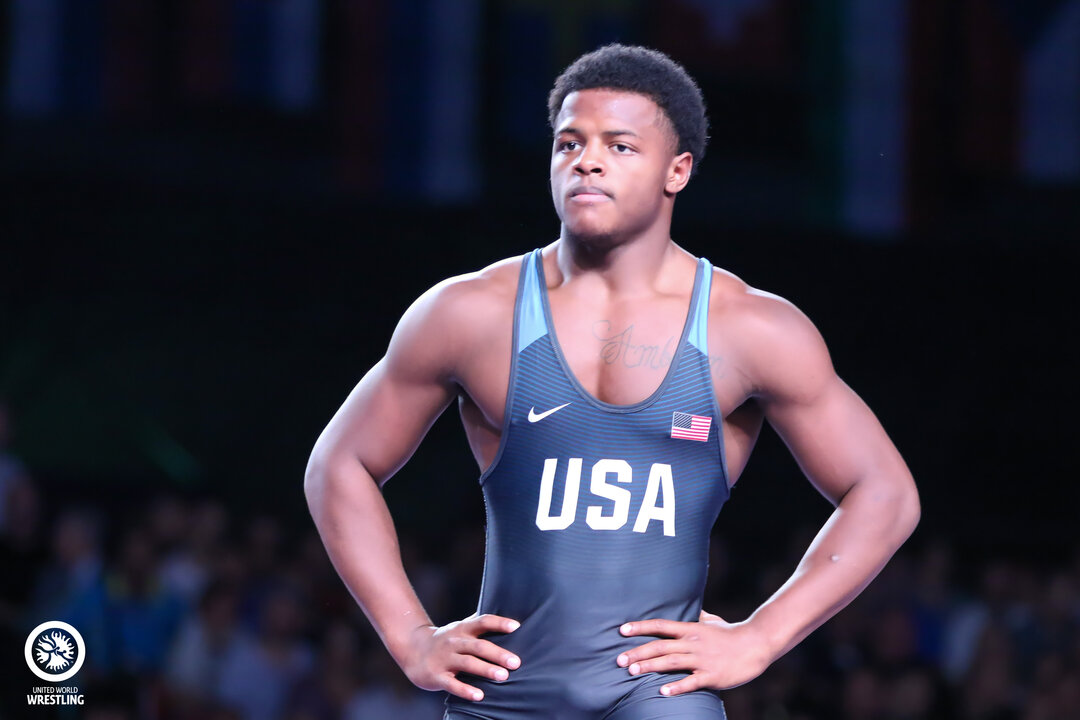 df. Akzhol MAKHMUDOV (KGZ) by VPO1, 16-11 _.jpg) Kamal BEY (USA), 2017 Junior World Champion. Photo by Marion Stein.
Kamal BEY (USA), 2017 Junior World Champion. Photo by Marion Stein.
USA
55kg - Brady KOONTZ
60kg - Taylor LA MONT
63kg - Alston NUTTER
67kg - Peyton OMANIA
72kg - Tyler DOW
77kg - Kamal BEY
82kg - Andrew BERREYESA
87kg - Barret HUGHES
97kg - Chad PORTER
130kg - Cohlton SCHULTZ
UZB
63kg - Turabek TIRKASHEV
67kg - Kamol KUZIEV
72kg - Makhmud BAKHSHILLOEV
82kg - Alijon KHUSEYNOV
97kg - Abubakr ALIMOV
130kg - Temur Mirzo MAMAJANOV

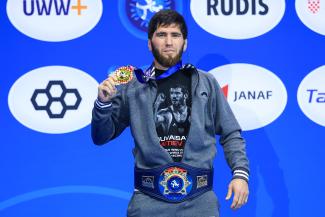
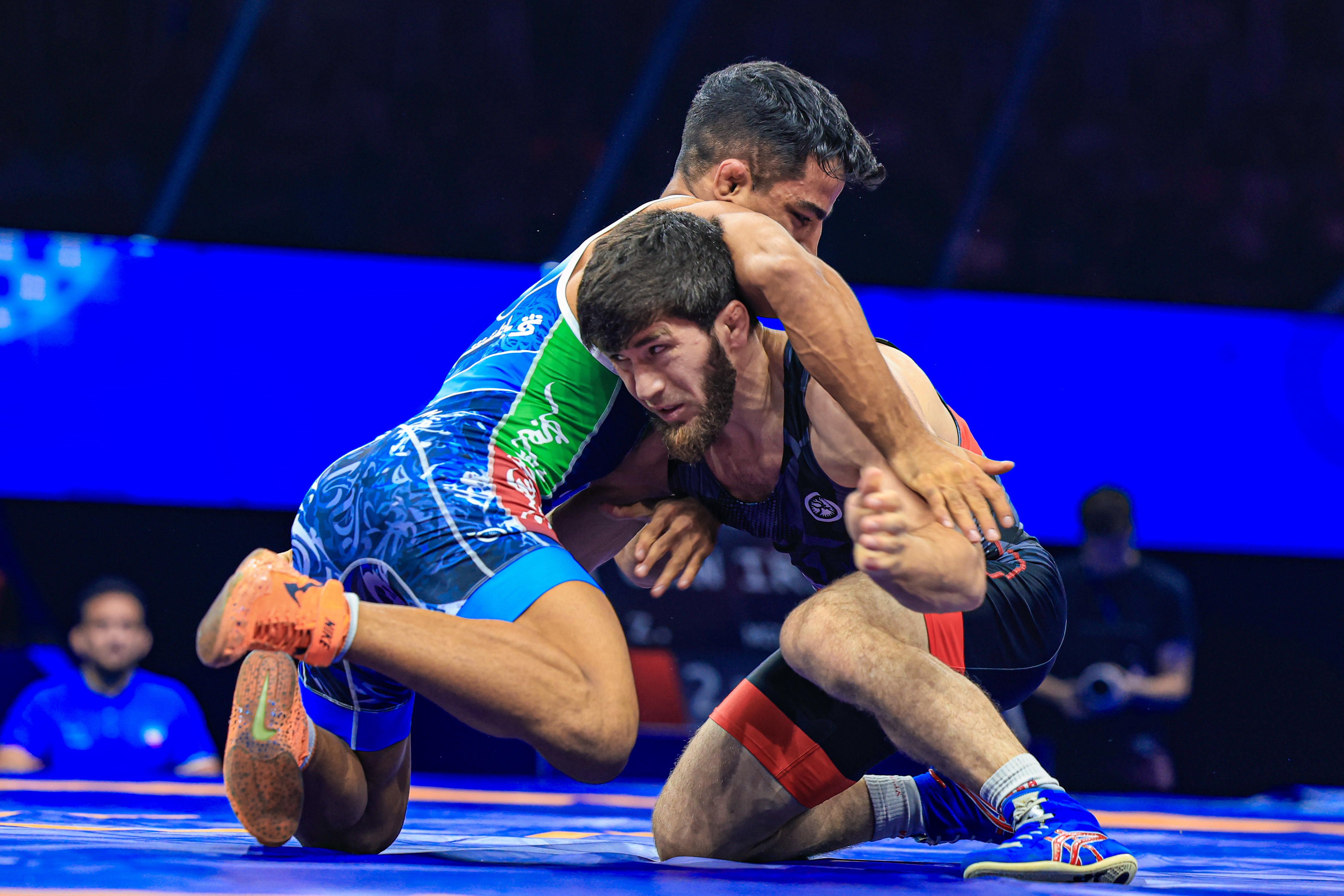 Zavur UGUEV (UWW) tries to score against Ahmad JAVAN (IRI) in the 61kg final. (Photo: United World Wrestling / Amirreza Aliasgari)
Zavur UGUEV (UWW) tries to score against Ahmad JAVAN (IRI) in the 61kg final. (Photo: United World Wrestling / Amirreza Aliasgari)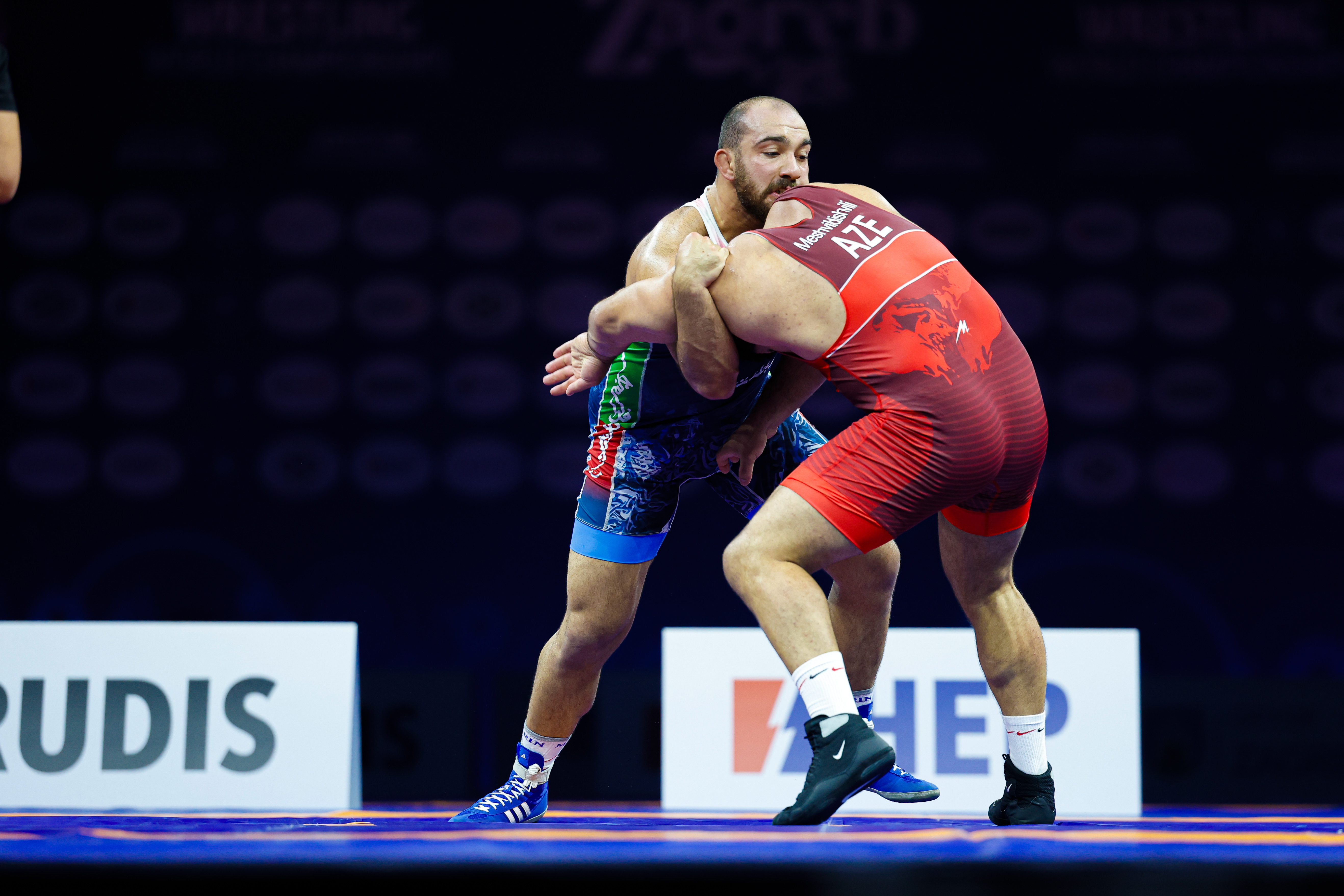 Amir Hossein ZARE (IRI) wrestles Giorgi MESHVILDISHVILI (AZE) in the 125kg final at the World Championships. (Photo: United World Championships / Kostadin Andonov)
Amir Hossein ZARE (IRI) wrestles Giorgi MESHVILDISHVILI (AZE) in the 125kg final at the World Championships. (Photo: United World Championships / Kostadin Andonov)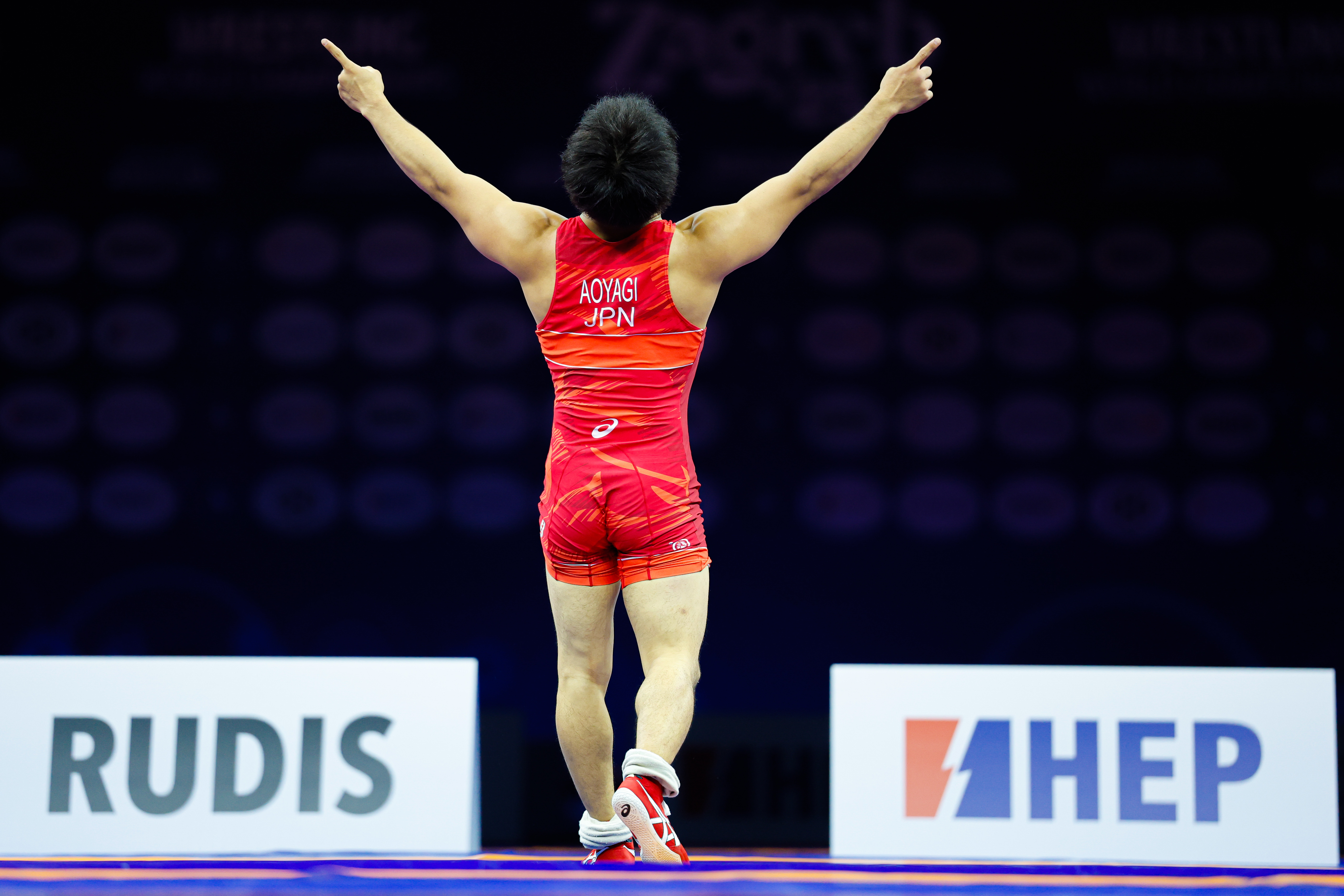 Yoshinosuke AOYAGI (JPN) celebrates after winning the 70kg final. (Photo: United World Wrestling / Kostadin Andonov)
Yoshinosuke AOYAGI (JPN) celebrates after winning the 70kg final. (Photo: United World Wrestling / Kostadin Andonov)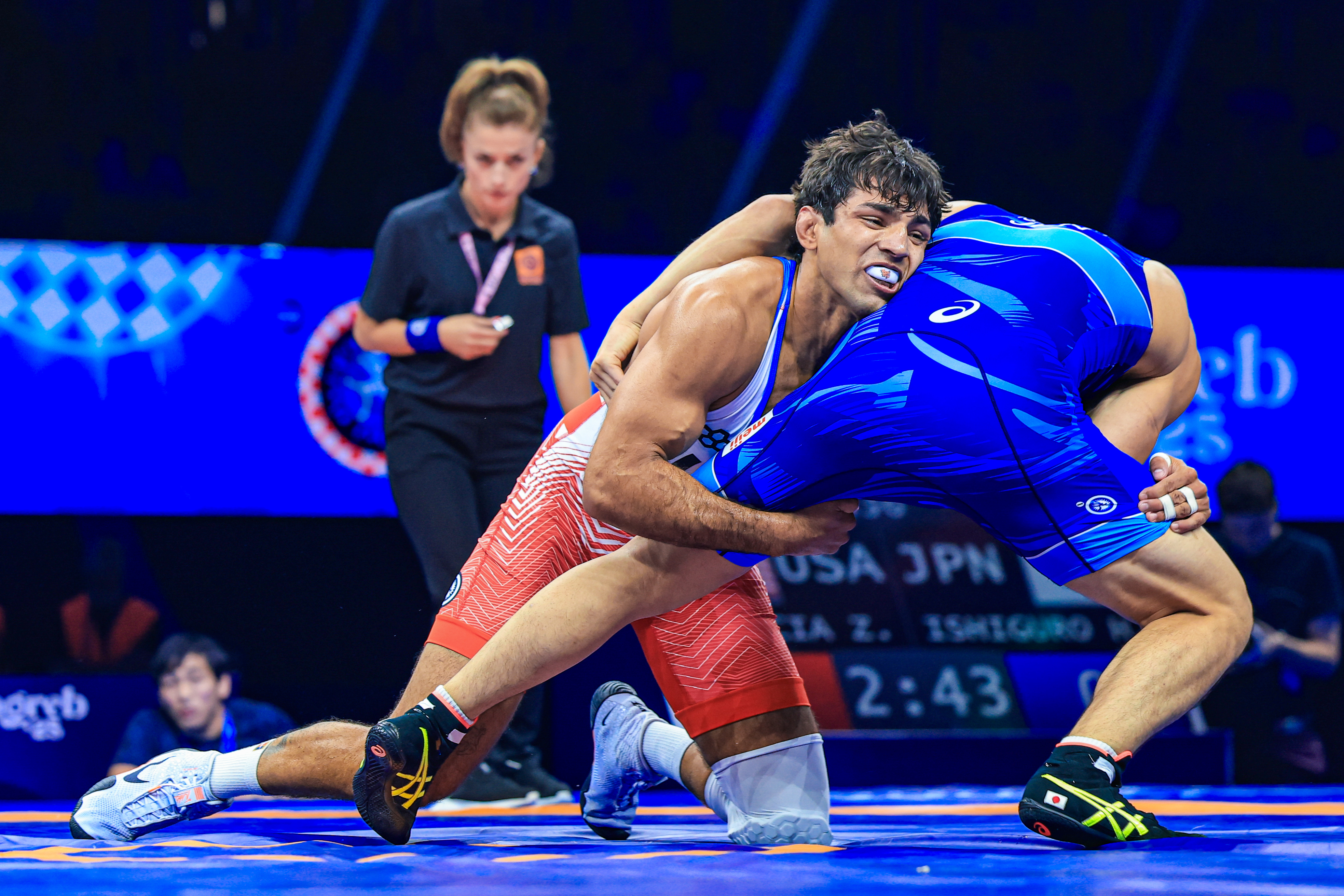 Zahid VALENCIA (USA) scores a takedown against Hayato ISHIGURO (JPN) in the 86kg final. (Photo: United World Wrestling / Amirreza Aliasgari)
Zahid VALENCIA (USA) scores a takedown against Hayato ISHIGURO (JPN) in the 86kg final. (Photo: United World Wrestling / Amirreza Aliasgari)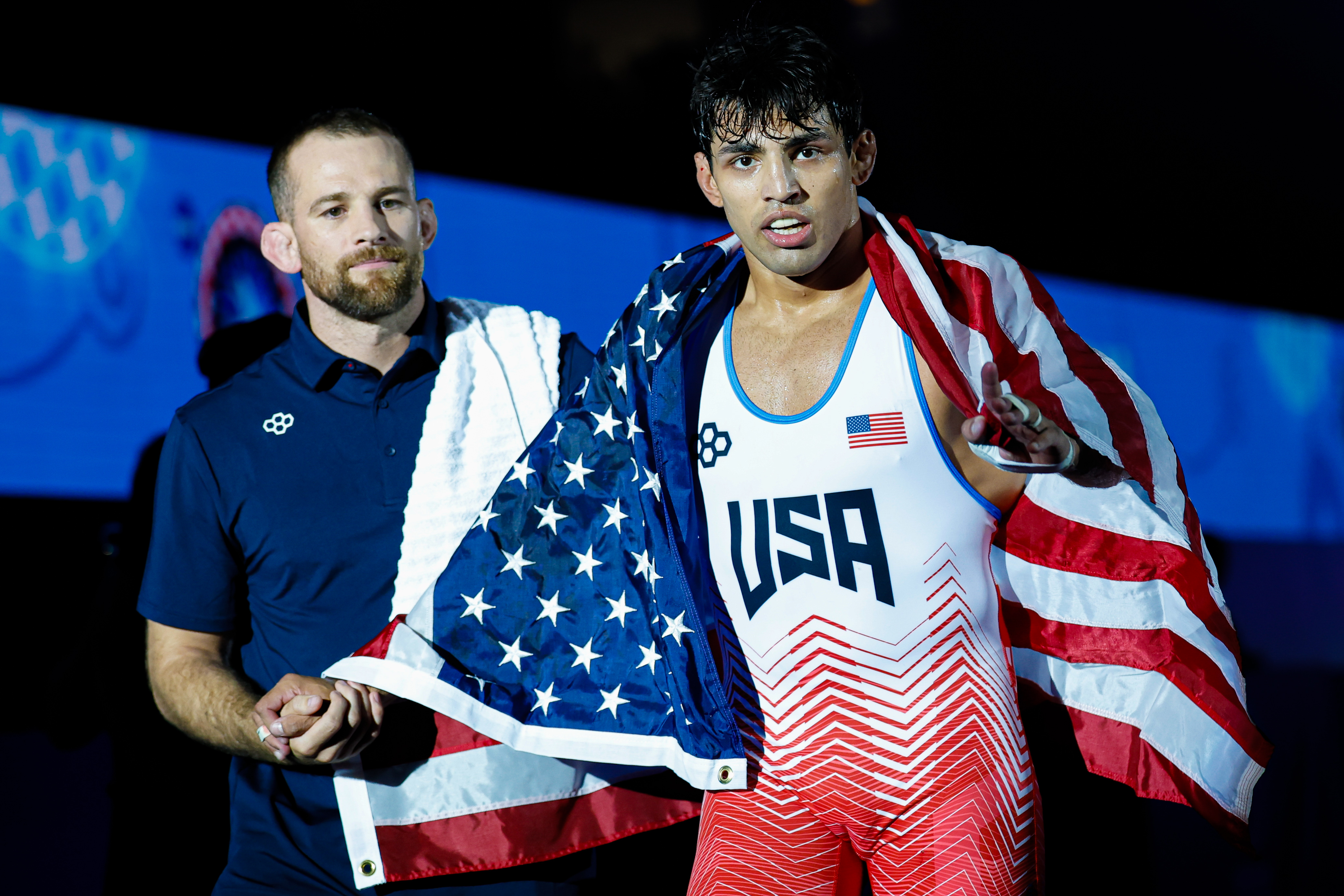 Zahid VALENCIA (USA), right, with coach David TAYLOR, after winning the 86kg final. (Photo: United World Wrestling / Kostadin Andonov)
Zahid VALENCIA (USA), right, with coach David TAYLOR, after winning the 86kg final. (Photo: United World Wrestling / Kostadin Andonov)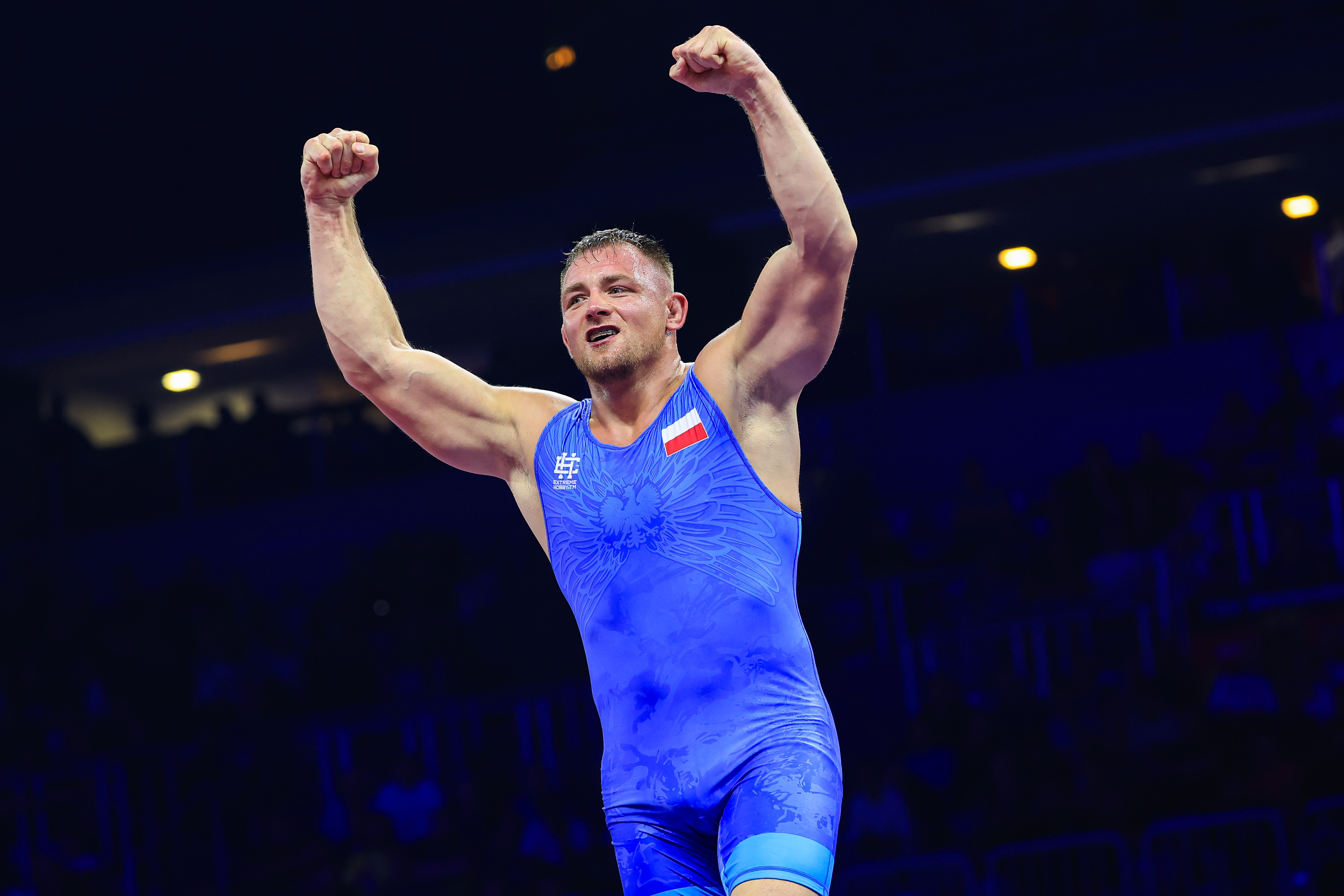 Robert BARAN (POL) celebrates after winning his bronze-medal bout at 125kg. (Photo: United World Wrestling / Kadir Caliskan)
Robert BARAN (POL) celebrates after winning his bronze-medal bout at 125kg. (Photo: United World Wrestling / Kadir Caliskan)
Share your thoughts.
Comments